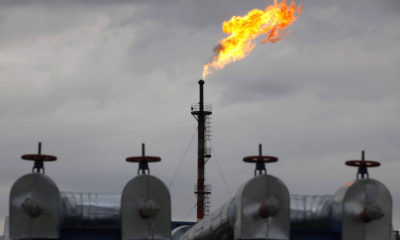- ‘Oil Firms Flared $2.5b Worth of Gas’
Oil producing companies in Nigeria have flared gas worth $2.5billion (N875billion) in the last one year, checks have shown.
The firms include the International Oil Companies (IOCs), Independent Producers and the Nigerian Petroleum Development Company (NPDC).
Data from the Department of Petroleum Resources (DPR), revealed that the volume of gas that was not commercialised (flared or re-injected) in March 2019 alone rose to 42 per cent.
Corroborating the DPR data, AfriPERA, an Energy and Infrastructure Policy research organisation, said that Nigeria lost an average of N875 billion ($2.5 billion) between March 2018 and March 2019 from gas flaring.
The company’s Chief Executive Officer, Mr. Chinedu Onyeizu said, said the loss, was aside the unattended impact of negative externalities associated with gas flaring.
“Since the 1950s, Nigeria has been burning off its natural gas at flare points and, despite efforts by successive administrations to curtail the wastage, the country loses an estimated 2.5 billion dollars each year to gas flaring as well as the unattended impact of negative externalities associated to gas flaring,’’ he said.
Also, the Chairman, Oil Producers Trade Section (OPTS), Paul McGrath, explained in a reaction to gas production, that gas provides a unique opportunity to provide steady, widely-available, cost-effective and generally affordable power to Nigerians.
He added that a shift to gas-fuelled power generation would represent significant savings opportunities over sources such as diesel, which is multiple times more expensive than gas at the current price of $2.5/mmbtu.
Gas production, according to the DPR report, increased by 15.4per cent at 263.48billion cubic feet compared to the output in proceeding period of February 2019.
This translated to an average daily production of 8,499.58 million standard cubic feet of gas per day (mmscfd). Out of the volume of gas supplied in March 2019, 155.01bcf of gas was commercialised, consisting of 40.35bcf, and 111.66bcf for the domestic and export markets.
The report indicated that 58.81 per cent of the average daily gas produced was commercialised, while the balance of 41.19 was re-injected, used as upstream fuel gas or flared recorded gas flaring.
The Senate had, on April 18, passed a new bill, which provided for a penalty against gas flaring and other malpractices in the oil and gas sector. Prior to this, Associated Gas Re-Injection Act of 1979 was in place to check sharp practices in the sector. Since then, there has been no review or amendment of the Act despite its devastating effect on the host communities, until April this year, when the Senate passed a new bill on gas flaring.
One of the highlights of the new Bill is that any licensee who supplies inaccurate data to the Department of Petroleum Resources (DPR) or to any other lawful authority will be liable, upon conviction, to a fine of N10 million or be committed to prison for a term of six months or both.
Other objectives of the Bill include ensuring that natural gas is not flared or vented in any oil and gas production operation, block or field, onshore or offshore, or any gas facility, which shall commence operations after the commencement of the Act.
The Bill also seeks to ensure that no operator establishes an Oil and Gas facility in the country without first obtaining authorisation from the Minister for the design, commissioning and production phases. The Bill comprises 22 sections including sections on punishment for the supply of inaccurate data, the gas flaring penalty fee, powers of the minister to make regulations, as well as a repeal of the Associated Gas Re-injection Act 1979.
Sponsor of the Bill, Senator Bassey Albert, said: “The approval of the long-awaited legislation on gas flaring after 40 years is one of the best parting gifts, the 8th Senate could possibly offer Nigerians at this time.”

 Naira4 weeks ago
Naira4 weeks ago
 Naira4 weeks ago
Naira4 weeks ago
 Travel3 weeks ago
Travel3 weeks ago
 Jobs4 weeks ago
Jobs4 weeks ago
 Naira3 weeks ago
Naira3 weeks ago
 Naira3 weeks ago
Naira3 weeks ago
 Investment4 weeks ago
Investment4 weeks ago
 Travel4 weeks ago
Travel4 weeks ago






















